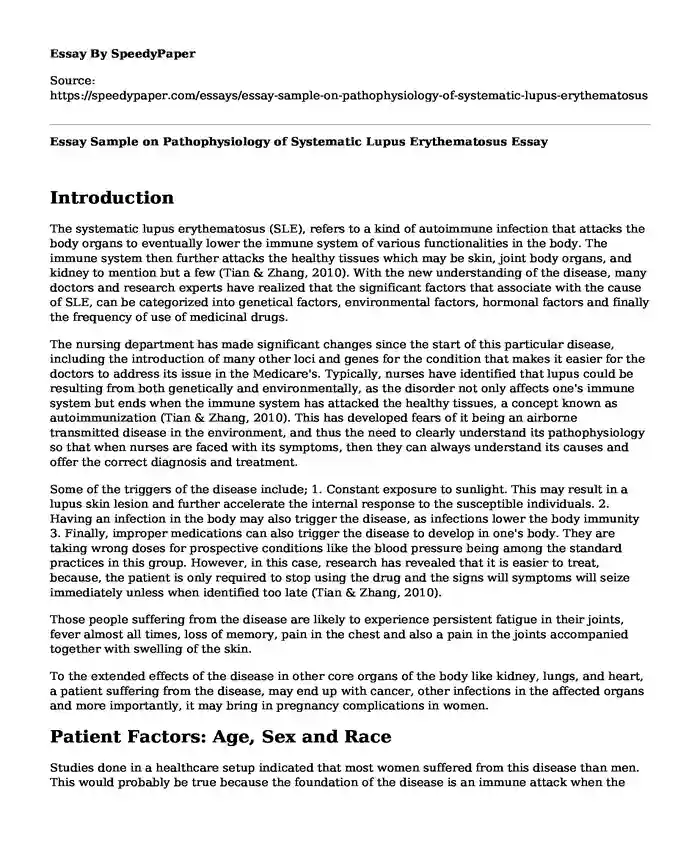
| Type of paper: | Essay |
| Categories: | Healthcare |
| Pages: | 3 |
| Wordcount: | 705 words |
Introduction
The systematic lupus erythematosus (SLE), refers to a kind of autoimmune infection that attacks the body organs to eventually lower the immune system of various functionalities in the body. The immune system then further attacks the healthy tissues which may be skin, joint body organs, and kidney to mention but a few (Tian & Zhang, 2010). With the new understanding of the disease, many doctors and research experts have realized that the significant factors that associate with the cause of SLE, can be categorized into genetical factors, environmental factors, hormonal factors and finally the frequency of use of medicinal drugs.
The nursing department has made significant changes since the start of this particular disease, including the introduction of many other loci and genes for the condition that makes it easier for the doctors to address its issue in the Medicare's. Typically, nurses have identified that lupus could be resulting from both genetically and environmentally, as the disorder not only affects one's immune system but ends when the immune system has attacked the healthy tissues, a concept known as autoimmunization (Tian & Zhang, 2010). This has developed fears of it being an airborne transmitted disease in the environment, and thus the need to clearly understand its pathophysiology so that when nurses are faced with its symptoms, then they can always understand its causes and offer the correct diagnosis and treatment.
Some of the triggers of the disease include; 1. Constant exposure to sunlight. This may result in a lupus skin lesion and further accelerate the internal response to the susceptible individuals. 2. Having an infection in the body may also trigger the disease, as infections lower the body immunity 3. Finally, improper medications can also trigger the disease to develop in one's body. They are taking wrong doses for prospective conditions like the blood pressure being among the standard practices in this group. However, in this case, research has revealed that it is easier to treat, because, the patient is only required to stop using the drug and the signs will symptoms will seize immediately unless when identified too late (Tian & Zhang, 2010).
Those people suffering from the disease are likely to experience persistent fatigue in their joints, fever almost all times, loss of memory, pain in the chest and also a pain in the joints accompanied together with swelling of the skin.
To the extended effects of the disease in other core organs of the body like kidney, lungs, and heart, a patient suffering from the disease, may end up with cancer, other infections in the affected organs and more importantly, it may bring in pregnancy complications in women.
Patient Factors: Age, Sex and Race
Studies done in a healthcare setup indicated that most women suffered from this disease than men. This would probably be true because the foundation of the disease is an immune attack when the bodies of women are always very vulnerable, and thus, their bodies are at higher risks of contracting this disease. Lack of exercise also weakens immunity; therefore, it is also a contributing factor to explain why women usually experience many effects. More men attend to physical fitness activities than women. Also, age plays a significant role. Despite lupus being age inconsiderate, people of ages 15-45 are prone to the infections as the study revealed. Additionally, the results also showed that worldwide, Black Americans, Asians who reside in America and those from Hispania are the significant populations affected by the disease.
Diagnosis and Treatment
There is no definite cure for the disease, though, if not for the drugs that are meant to lower its effects progressively until all the symptoms flare up. Recently, Rituximab and Belimumab are the best drugs that nurses use to treat those with severe conditions of lupus. However, minor ailments are treated up with other drugs depending on the organ infected by the disease genes (Arbuckle, 2003).
References
Arbuckle, M. R., McClain, M. T., Rubertone, M. V., Scofield, R. H., Dennis, G. J., James, J. A., & Harley, J. B. (2003). Development of autoantibodies before the clinical onset of systemic lupus erythematosus. New England Journal of Medicine, 349(16), 1526-1533.
Tian, X. P., & Zhang, X. (2010). Gastrointestinal involvement in systemic lupus erythematosus: insight into pathogenesis, diagnosis, and treatment. World journal of gastroenterology: WJG, 16(24), 2971.
Cite this page
Essay Sample on Pathophysiology of Systematic Lupus Erythematosus. (2023, Jan 15). Retrieved from https://speedypaper.com/essays/essay-sample-on-pathophysiology-of-systematic-lupus-erythematosus
Request Removal
If you are the original author of this essay and no longer wish to have it published on the SpeedyPaper website, please click below to request its removal:
- Essay Sample on Religious Freedom in America
- What Brings Joy In My Life? Personal Essay Example
- Introduction of Opinions and Expert Testimony at Trial - Free Essay in Crimial Law
- Teaching Essay Example on Sinking and Floating
- Change Approach Essay Example
- Essay Sample on the Short Stories by Kate Chopin
- Paper Example on Malaria: An Infectious Disease Transmitted by Female Mosquitoes
Popular categories




